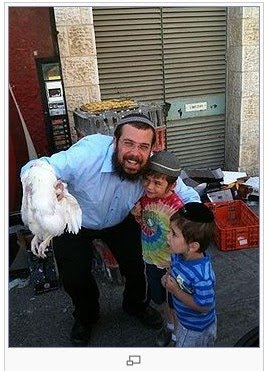Kaparot with Chickens: Custom or Cruelty?
I grew up doing the ritual of Kapparot (or Kaporos, in Ashkenazic Hebrew), meaning "atonements" in English--with coins to be given for tzedakah (generally translated as charity, although in Hebrew it really means "righteousness").
My parents and grandparents, however, grew up with the more ancient Jewish custom of waving a live chicken or a rooster (depending on the gender of the "sinner") over one's head while uttering a formal statement expressing that one's sins are hereby transferred to the chicken/rooster, which is then slaughtered and given to the poor.
That was the old way of doing the ritual: with live fowl. In past years (about twenty years ago) we, ourselves also used live chickens and roosters, as that was the custom in our former Hassidic congregation. These last ten years or so we have reverted back to using coins.
I have mixed feelings about this ritual. On the one hand, there is a sort of nostalgia for the way of this ritual which Jews have done for centuries; one doesn't want to end an ancient custom, as it connects us with our past while looking towards the future. But on the other hand, I agree with PETA (and I rarely agree with them) that there is definitely a humane issue with waving live chickens over someone's head. The birds are probably scared to death (no pun intended here) and disoriented, to say the least.
Perhaps in Eastern Europe, where there was great poverty, chickens were a bit more prevalent than spare coins--so it was done thus. However, being uncomfortable with the thought of returning to live fowl, my D.H. and I started the discussion again this year. And we were not alone in ruminating about this: the Rambam also wrote against the ritual with fowl, stating that personal philosophical reflection, penitence and prayer are more worthy than sacrifice (which is what we are doing with these poor chickens) in repenting for our sins. Other great Jewish sages such as the Ramban (Nachmanides), Yosef Karo (who complied the Shulchan Aruch) stated that this was not originally a Jewish ritual, but rather associated with non-Jewish practices.
In the end, I agree with Rav Chaim David HaLevy (a"h), who stated thus in his work "Aseh Lekha Rav":
(At least, one chicken and one rooster will sleep easy this coming Friday eve...)
My parents and grandparents, however, grew up with the more ancient Jewish custom of waving a live chicken or a rooster (depending on the gender of the "sinner") over one's head while uttering a formal statement expressing that one's sins are hereby transferred to the chicken/rooster, which is then slaughtered and given to the poor.
That was the old way of doing the ritual: with live fowl. In past years (about twenty years ago) we, ourselves also used live chickens and roosters, as that was the custom in our former Hassidic congregation. These last ten years or so we have reverted back to using coins.
I have mixed feelings about this ritual. On the one hand, there is a sort of nostalgia for the way of this ritual which Jews have done for centuries; one doesn't want to end an ancient custom, as it connects us with our past while looking towards the future. But on the other hand, I agree with PETA (and I rarely agree with them) that there is definitely a humane issue with waving live chickens over someone's head. The birds are probably scared to death (no pun intended here) and disoriented, to say the least.
Perhaps in Eastern Europe, where there was great poverty, chickens were a bit more prevalent than spare coins--so it was done thus. However, being uncomfortable with the thought of returning to live fowl, my D.H. and I started the discussion again this year. And we were not alone in ruminating about this: the Rambam also wrote against the ritual with fowl, stating that personal philosophical reflection, penitence and prayer are more worthy than sacrifice (which is what we are doing with these poor chickens) in repenting for our sins. Other great Jewish sages such as the Ramban (Nachmanides), Yosef Karo (who complied the Shulchan Aruch) stated that this was not originally a Jewish ritual, but rather associated with non-Jewish practices.
In the end, I agree with Rav Chaim David HaLevy (a"h), who stated thus in his work "Aseh Lekha Rav":
"Why should we, specifically on the eve of the holy day of Yom Kippur, be cruel to animals for no reason, and slaughter them without mercy, just as we are about to request compassion for ourselves from the living G-d?”So the outcome of our discussion? D. H. and I decided again this year to use coins for the Kapparot ceremony, which we will give to tzedakah--in lieu of chickens.
(At least, one chicken and one rooster will sleep easy this coming Friday eve...)


Comments
Thank you. Though I haven't gone so far as to be vegetarian yet...(!)
As for the custom of kapparot,it gives one something of the feeling of what sacrifices were like in the temple.I personally found it an authentic religeous experience.BTW the squemish should stay away from the part of the Yom Kippur service which describes the ritual as it was performed in the Temple.It is full of slaughter and the sprinkling of blood, not to mention the scapegoat which was thrown off a cliff.Remember,three times a day we pray for the restoration of the temple service.
I am very familiar with the Yom Kippur service describing the korbanot. I was actually thinking about it as I read it in shul, and also the scapegoat sent to Azazel.
I want the Beit Hamikdash to be rebuilt: that would mean that we Jews have sovereignty over all of Yerushalayim--but perhaps we should not return to the ancient sacrifices; maybe it's time for just mincha belulah ba-shemen...?